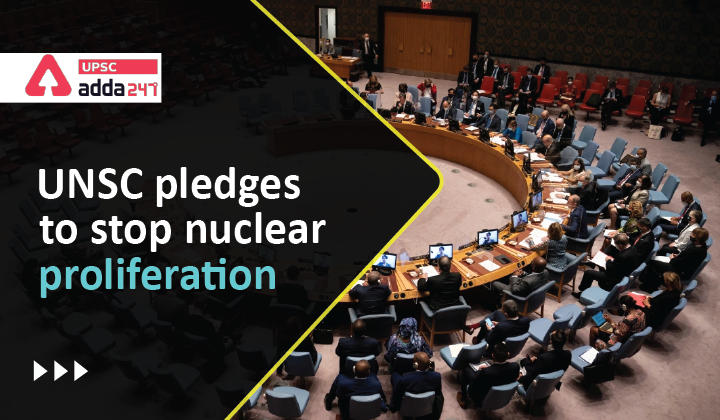Table of Contents
UNSC Pledges to Stop Nuclear Proliferation: Relevance
- GS 2: Important International institutions, agencies and fora – their structure, mandate.
UNSC Pledges to Stop Nuclear Proliferation: Context
- Recently, UNSC permanent members (P5)—China, France, Russia, the UK and the US pledged to prevent the proliferation of nuclear arms.
UNSC Pledges to Stop Nuclear Proliferation: Key points
- Five of the world’s nuclear powers have also said that nuclear war is not an option to any of the present situation.
- The joint statement said that a nuclear war cannot be won and must never be fought.
- There was also affirmation that “nuclear weapons — for as long as they continue to exist — should serve defensive purposes, deter aggression, and prevent war.
- The joint pledge was issued ahead of the latest review of the Treaty of the Non-proliferation of Nuclear Weapons (NPT), that was postponed to later this year.
- The joint agreement will help increase mutual trust and replace competition among major powers with coordination and cooperation.
UNSC Pledges to Stop Nuclear Proliferation: Aims of P5
- The P5 members agreed to pursue negotiations in good faith on effective measures relating to cessation of the nuclear arms race at an early date and to nuclear disarmament, and on a treaty on general and complete disarmament under strict and effective international control.
What is NPT?
- The NPT is a landmark international treaty whose objective is to prevent the spread of nuclear weapons and weapons technology, to promote cooperation in the peaceful uses of nuclear energy and to further the goal of achieving nuclear disarmament and general and complete disarmament.
- The Treaty represents the only binding commitment in a multilateral treaty to the goal of disarmament by the nuclear-weapon States. Opened for signature in 1968, the Treaty entered into force in 1970.
- The Treaty is regarded as the cornerstone of the global nuclear non-proliferation regime and an essential foundation for the pursuit of nuclear disarmament.
- It was designed to prevent the spread of nuclear weapons, to further the goals of nuclear disarmament and general and complete disarmament, and to promote cooperation in the peaceful uses of nuclear energy.
- South Africa remains the only country known to have developed nuclear weapons and then to have dismantled its nuclear arsenal completely.
- North Korea is the only country to withdraw from the treaty.
P5 nations: Geopolitical tensions
- The global powers have been dealing with a lot of geopolitical tensions.
- US has warned Russia of sanctions if Russia further invade Ukraine.
- Relations between Beijing and Washington are also strained over the status of Taiwan and increased military activity in the Pacific.
- In December last year, both the US and the EU accused Beijing of undermining peace and security in the region.
Also Read:
| Domestic Systematically Important Insurers | Rani Velu Nachiyar- Jhansi Rani of Tamil Nadu | Solid State Lithium Metal Battery | Azadi Ka Amrit Mahotsav- Climate Change Awareness Campaign and National Photography Competition |
| Balance of Payment | National Educational Alliance for Technology (NEAT) Scheme | Government Planning to Blend Green Hydrogen with Natural Gas | District Good Governance Index (DGGI) |
| James Webb Telescope | NITI Aayog signs a SoI with the UNWFP- Strengthening Climate Resilient Agriculture | National Mission on Edible Oil- Oil Palm Business Summit | Foreign Contribution Regulation Act |



 TSPSC Group 1 Question Paper 2024, Downl...
TSPSC Group 1 Question Paper 2024, Downl...
 TSPSC Group 1 Answer key 2024 Out, Downl...
TSPSC Group 1 Answer key 2024 Out, Downl...
 UPSC Prelims 2024 Question Paper, Downlo...
UPSC Prelims 2024 Question Paper, Downlo...




